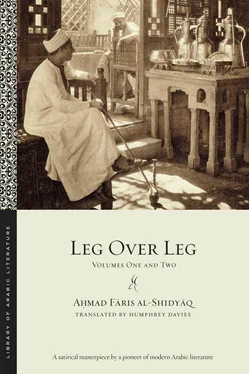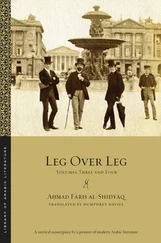377“the rujum —‘the stars used for stoning’” ( rujumuhā—al-nujūmu llatī yurmā bihā ): the stars with which God stones Satan, who is commonly referred to as al-rajīm for this reason; in popular belief, shooting stars (see, for Egypt, Lane, Manners , 223).
378“the Two Calves” ( al-farqadayn ): stars γ and β in Ursa Minor (the Little Dipper); also known as Pherkad and Kochab ( al-kawkab ).
379“all those gazettes” ( fī hādhihi l-waqāʾiʿ al-ikhbāriyyah ): no doubt a reference to Al-Waqāʾiʿ al-Miṣriyyah , on which see further n. 132 to 2.11.5 below.
380“Friends of God” ( awliyāʾ Allāh ): individuals believed to be chosen by God for special favor; sometimes they manifest unusual spiritual powers.
381“to bring about divorces” ( li-l-taṭlīq ): a reference, perhaps, to the notary ( maʾdhūn ) who gives formal recognition to a divorce.
382“as a legitimizer” ( li-l-taḥlīl ): if a Muslim man divorces his wife three times — thus irrevocably — and then regrets his act, he may hire a man (known as a muḥallil , approx. “legitimizer”) to marry her and then divorce her, rendering remarriage legally possible.
383Though the references in the following passage are, in some cases, at least, to recognized rhetorical figures, their precise meaning is less important than the impression of erudite obfuscation that they convey.
384“the method of the sage” ( uslūb al-ḥakīm ): taking advantage of an inappropriate or unanswerable question to open a more important discussion.
385“person-switching” ( iltifāt ): a rhetorical figure consisting of an “abrupt change of grammatical person from second to third and from third to second,” as in the words of the poet Jarīr “When were the tents at Dhū Ṭulūḥ? O tents, may you be watered by ample rain!” (Meisami and Starkey, Encyclopedia , 2:657).
386“tight weaving” ( iḥtibāk ): a rhetorical figure defined, in a widely taught formulation (http://www.alfaseeh.com/vb/showthread.php?t=9355), as “the omission from the earlier part of the utterance of something whose equal or equivalent comes in the later, and the omission from the later of something whose equal or equivalent comes in the earlier”; an example is the Qurʿānic verse “a company that fights for God and a disbelieving company” (Q Āl ʿImrān 3:13), meaning “a [believing] company that fights for God and a disbelieving company [that fights for the Devil].”
387“an Arabized word”: via Latin, from Greek manganon .
388“like common caltrops” ( ʿalā mithāl al-ḥasak al-maʿrūf ): i.e., like star-weed ( Centaurea calcitrapa ), whose spiked seed-cases pierce sandals and feet when stepped on.
389“a padded outer garment… a weapon… thick shields”: the confusion as to the word’s meaning seems to stem from its foreign, probably Persian, origin.
390“a device for war worn by horse and man alike”: cataphract armor.
391 al-ʿadhrāʾ : literally, “the virgin”—“a kind of collar by means of which the hands, or arms, are confined together with the neck” (Lane, Lexicon ).
392Jadīs and Ṭasm: related tribes of ʿĀd, a pre-Islamic people destroyed, according to the Qurʾan, for their ungodliness.
393al-ʿAbbās ibn Mirdās: an early Meccan convert to Islam who burned al-Dimār, the idol of his clan.
394ʿAmr ibn Luḥayy: a leader of Mecca in the Days of Barbarism, and supposedly the first to introduce the worship of idols into the Arabian Peninsula.
395“Ilyās, peace be upon him”: Ilyās (Elias) is regarded in Islam as a prophet.
396“ʿUrwah’s hadith ‘al-Rabbah’” ( ḥadīth ʿUrwatin al-Rabbah ): the tradition recounts that a recent convert to Islam, ʿUrwah ibn Masʿūd, was refused entry to his home unless he first visited “al-Rabbah” (literally, “the Mistress”), “meaning al-Lāt, which is the rock that [the tribe of] Thaqīf used to worship at al-Ṭāʾif” (see Ibn al-Athīr, Al-Nihāyah, 1:56).
397Dhāt ʿIrq: a place, 92 kilometers north of Mecca.
398“ Furdūd , Pherkad… Kuwayy ”: names of stars in this list that have accepted English names (all but one of which in fact derive from Arabic) are printed in regular font, while those impossible to identify from the extensive list provided by the Wikipedia article “List of Arabic Star Names” are transcribed in italics.
399“instruments that…”: see the Translator’s Afterword (Volume Four) on the choice of synonyms in this passage; note that, while the Arabic list contains forty-eight items, only forty-five are represented in the translation, because three ( daghz, zazz , and waqz ) could not be found in the dictionaries.
400“headgear of a generic nature” ( ʿimārāt ): ʿimārah is defined in the Qāmūs as “anything worn on the head, be it a turban ( ʿimāmah ), a cap ( qalansuwah ), a crown ( tāj ), or anything else.”
401“watermelon-shaped… cantaloupe-shaped… caps” ( bi-arāṣīṣ… bi-arāsīs ): while the author, in this footnote, specifies the shape of the former, the dictionaries say of the latter merely that it is “a cap” ( qalansuwah ); however, it seems to be a variant of the first.
402“judges’ tun-caps” ( danniyyāt ): so called from their resemblance to a dann or large wine barrel.
403“antimacassars” ( ṣawāqiʿ ): cloths worn by a woman on her head to protect her veil from grease ( Qāmūs ).
404“pass their hands over what is in front of the latter” ( yatamassaḥūna bi-mā amāmahu ): the significance is unclear; the Qāmūs cites the usage yutamassaḥu bi-hi (“people pass their hands over him/it,”) and says that it means yutabarraku bi-hi li-faḍlihi (“blessing is derived from him because of his/its virtue”). This brings to mind the habit of visitors to certain mosques of passing their hands over the grills enclosing saints’ tombs in the belief that they will thus obtain barakah (“grace”).
405“ underwear ” ( andarward ): the English word is probably intended; andarward may be due to a mishearing by the author or possibly a joke ( andar-ward “under-roses”).
406i.e., must never stop calling out pious phrases to warn those around him of his presence or that he is “coming through.”
407“As God wills!… O God!” ( mā shāʿa llāh… Allāh ): typical expressions of delight, pleasure, and appreciation, all of which invoke God’s name to protect the one praised from the possible effects of envy.
408“her peepings through her fingers against the sun to see…, her shading of her eyes against the sun to see and her peering through her fingers against the sun to see” ( istikfāfihā… wa-stīḍāḥihā wa-stishfāfihā ): all defined in the Qāmūs as synonyms.
409“a fourth way of walking, with further letters changed” ( wa-qahbalatihā ): again, defined in the Qamūs as “a way of walking.”
410“a fifth way of walking, with further letters changed” ( hayqalatihā ): again, defined in the Qamūs as “a way of walking.”
411“her walking with tiny steps” ( khadhʿalatihā ): the Qāmūs defines again as “a way of walking”; however, a second sense given is “cutting a watermelon etc. into small pieces.”
412“her marching proudly (spelled two ways)” ( tabahrusihāwa-tahabrusihā ): synonyms, meaning tabakhtur (“strutting”), according to the Lisān (s.v. tabahrasa ).
Читать дальше












